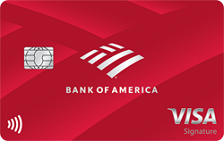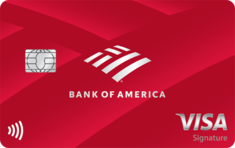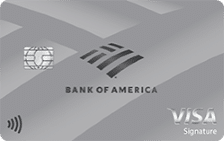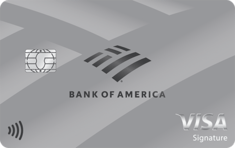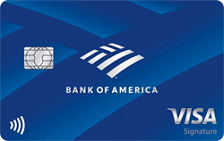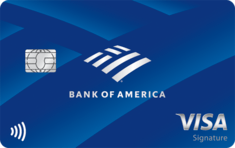Filter Options
×-
-
Unselect all
-
Unselect all
-
Unselect all

Showing 43 Cards
Sort By Column Name:
Bank of America® Premium Rewards® Elite Credit Card
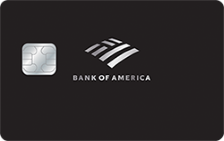
Bank of America® Premium Rewards® Elite Credit Card
- 20.24% to 27.24% variable based on creditworthiness and the Prime Rate Regular Purchase APR
- 20.24% to 27.24% variable based on creditworthiness and the Prime Rate Balance Transfer APR
- 23.24% to 30.24% variable based on creditworthiness and the Prime Rate Cash Advance APR
At a Glance
The Bank of America® Premium Rewards® Elite Credit Card provides members big points, big credits, and more for a $550 annual fee. The card earns 2X points on travel and dining, plus 1.5X on all other purchases, but that rewards rate increases by up to 75% depending on the cardholder’s Preferred Rewards tier.
- Best Benefits
- Rates & Fees
- Why Should You Apply?
- No foreign transaction fees
- Earn 2X points on eligible restaurant & travel purchases
- Earn 1.5X points on all other purchases
- Preferred Rewards members earn 25% to 75% more points
- Get up to $550 in automatic statement credits
- Regular Purchase APR: 20.24% to 27.24% variable based on creditworthiness and the Prime Rate
- Balance Transfer APR: 20.24% to 27.24% variable based on creditworthiness and the Prime Rate
- Balance Transfer Transaction Fee: Either $10 or 3% of the amount of each transaction, whichever is greater
- Cash Advance APR: 23.24% to 30.24% variable based on creditworthiness and the Prime Rate
- Cash Advance Transaction Fee: Either $10 or 5% of the amount of each transaction, whichever is greate
- Penalty APR: Up to 29.99% variable based on creditworthiness
- Annual Fee: $550
- Late Payment Penalty Fee: Up to $40
- You already bank with Bank of America
- You travel often and spend heavily to maximize points
- You want essential luxury travel perks, like TSA Precheck and lounge access
Bank of America® Premium Rewards® Credit Card
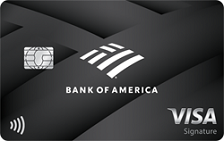
Bank of America® Premium Rewards® Credit Card
- 20.24% to 27.24% variable based on creditworthiness and the Prime Rate Regular Purchase APR
- 20.24% to 27.24% variable based on creditworthiness and the Prime Rate Balance Transfer APR
- 23.24% to 30.24% variable based on creditworthiness and the Prime Rate Cash Advance APR
At a Glance
The Bank of America® Premium Rewards® Credit Card earns its “Premium” designation by showering customers with travel perks, introductory bonuses, and points rewards. Whether you travel for business or pleasure on a fairly regular basis, this card can help you get around in style and comfort without an unreasonable price tag.
- Best Benefits
- Rates & Fees
- Why Should You Apply?
- 60,000 bonus points after you make at least $4,000 in purchases in the first 90 days of account opening
- 2X points per dollar spent on travel and dining purchases
- 1.5X points per dollar spent on all other purchases
- $100 Airport Security Statement Credit towards TSA Pre? ® or Global Entry Application fee, every four years
- Annual $100 statement credit for airline incidentals
- No blackout dates
- No foreign transaction fee
- Regular Purchase APR: 20.24% to 27.24% variable based on creditworthiness and the Prime Rate
- Balance Transfer APR: 20.24% to 27.24% variable based on creditworthiness and the Prime Rate
- Balance Transfer Transaction Fee: Either $10 or 3% of the amount of each transfer, whichever is greater
- Cash Advance APR: 23.24% to 30.24% variable based on creditworthiness and the Prime Rate
- Cash Advance Transaction Fee: Either $10 or 5% of the amount of each transaction, whichever is greater
- Penalty APR: Up to 29.99% variable based on creditworthiness the Prime Rate
- Annual Fee: $95
- Late Payment Penalty Fee: Up to $40
- Return Payment Penalty Fee: Up to $29
- You regularly use a credit card to make travel or dining purchases
- You’re interested in travel insurance for vacations or business trips
- You want to enroll in TSA Pre? ® or Global Entry Services, as well as other airline privileges
- You’re looking for a credit card to use abroad without foreign transaction fees
- You can take advantage of a curated list of luxury hotel properties with unique benefits provided by Visa
BankAmericard® Credit Card
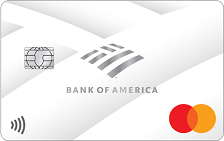
BankAmericard® Credit Card
- 16.24% to 26.24% variable based on creditworthiness and Prime Rate Regular Purchase APR
- 16.24% to 26.24% variable based on creditworthiness and Prime Rate Balance Transfer APR
- 19.24% to 29.24% variable based on the Prime Rate Cash Advance APR
- 0% for 18 months from account opening date Intro Purchase APR
At a Glance
The BankAmericard Mastercard is the balance transfer card designed for those who want a special intro rate and little else. The card features 0% intro APR on purchases and balance transfers for the first 18 months. The card also boasts no penalty APR and no annual fee.
- Best Benefits
- Rates & Fees
- Why Should You Apply?
- No interest charges on purchases and balance transfers for the first 18 months from the date of account opening
- No penalty APR for late payments
- No annual fee
- Access your FICO® Score for free
- Intro Purchase APR: 0% for 18 months from account opening date
- Regular Purchase APR: 16.24% to 26.24% variable based on creditworthiness and Prime Rate
- Intro Balance Transfer APR: 0% for 18 months for any balance transfers made within 60 days from account opening date
- Balance Transfer APR: 16.24% to 26.24% variable based on creditworthiness and Prime Rate
- Balance Transfer Transaction Fee: Either $10 or 3% of the amount of each transfer, whichever is greater
- Cash Advance APR: 19.24% to 29.24% variable based on the Prime Rate
- Cash Advance Transaction Fee: Either $10 or 5% of the amount of each transaction, whichever is greater
- Foreign Transaction Fee: 3% of the transaction amount in U.S. dollars
- Late Payment Penalty Fee: Up to $40
- Return Payment Penalty Fee: Up to $29
- You plan to make a large purchase and use the card to pay off the balance over time
- You have existing credit card balances to combine and pay down
- You don’t want to pay an annual fee
Business Advantage Customized Cash Rewards Credit Card
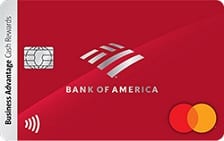
Business Advantage Customized Cash Rewards Credit Card
- 18.49% to 28.49% variable based on creditworthiness and the Prime Rate Regular Purchase APR
- 18.49% to 28.49% variable based on creditworthiness and the Prime Rate Balance Transfer APR
- 29.49% variable based on the Prime Rate Cash Advance APR
- 0% for 9 months from account opening date Intro Purchase APR
At a Glance
The Business Advantage Cash Rewards Mastercard® is a great starter card for business owners who want customizable 3% cash back categories and a card without an annual fee. Ideal for small businesses or startups with modest expenditures.
- Best Benefits
- Rates & Fees
- Why Should You Apply?
- $300 statement credit bonus after spending $3,000 with 90 days
- 3% cash back on the category of your choice
- 2% back at restaurants
- 1% cash back on all other purchases
- Cash earnings never expire
- Intro Purchase APR: 0% for 9 months from account opening date
- Regular Purchase APR: 18.49% to 28.49% variable based on creditworthiness and the Prime Rate
- Balance Transfer APR: 18.49% to 28.49% variable based on creditworthiness and the Prime Rate
- Balance Transfer Transaction Fee: $10 or 4% of the amount of each transaction, whichever is greater
- Cash Advance APR: 29.49% variable based on the Prime Rate
- Cash Advance Transaction Fee: $10 or 4% of the amount of each transaction, whichever is greater.
- Foreign Transaction Fee: 3% of the U.S. dollar amount of each transactio
- Late Payment Penalty Fee: Up to $49
- Return Payment Penalty Fee: $39
- You have business expenses that are less than $50,000 per year
- You will take advantage of the introductory bonus by spending $3,000 in the first 90 days
- You want a versatile card that can also give you points for everyday (non-business) dining expenses
- You don’t want to pay an annual fee
Business Advantage Unlimited Cash Rewards Credit Card
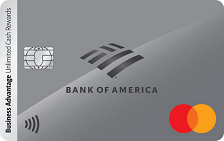
Business Advantage Unlimited Cash Rewards Credit Card
- 18.49% to 28.49% variable based on creditworthiness and the Prime Rate Regular Purchase APR
- 18.49% to 28.49% variable based on creditworthiness and the Prime Rate Balance Transfer APR
- 29.49% variable based on the Prime Rate Cash Advance APR
- 0% for the 9 months Intro Purchase APR
At a Glance
The Business Advantage Unlimited Cash Rewards Credit Card provides a base rate of unlimited 1.5% cash back on purchases, with that rate rising to 2.62% for eligible Preferred Rewards for Business account holders. The card also provides a decent selection of introductory bonuses with no annual fee.
- Best Benefits
- Rates & Fees
- Why Should You Apply?
- No annual fee
- Unlimited 1.5% cash back on every purchase
- Get a $300 statement credit when you make at least $3,000 in net purchases within 90 days of your account opening
- 0% Intro APR on purchases for 9 billing cycles from account opening
- Intro Purchase APR: 0% for the 9 months
- Regular Purchase APR: 18.49% to 28.49% variable based on creditworthiness and the Prime Rate
- Balance Transfer APR: 18.49% to 28.49% variable based on creditworthiness and the Prime Rate
- Balance Transfer Transaction Fee: Either $10 or 4% of the amount of each transaction, whichever is greater
- Cash Advance APR: 29.49% variable based on the Prime Rate
- Cash Advance Transaction Fee: Either $10 or 4% of the amount of each transaction, whichever is greater
- Foreign Transaction Fee: 3% of the U.S. dollar amount of each transactio
- Late Payment Penalty Fee: Up to $49
- Minimum Deposit Required: N/AP TO $49
- You own a small-to-medium-sized company and want an unlimited cash back card
- You already have a deposit account with Bank of America, including a Preferred Rewards for Business account
- You don’t want to pay an annual fee
You’ve viewed 5 of 43 credit cards
Benefits of Bank of America Credit Cards
Bank of America is a popular option for those looking for a quality credit card. The bank currently has over 58 million cardholders, which accounts for over 10% of all the credit cards in the United States.
Bank of America (BOA) is an excellent option for those who like the convenience of a bank with thousands of locations across the country. The bank is seemingly on every street corner, with over 4,200 branches nationwide. The bank is also known for its customer service, which ranks high amongst customers.
Bank of America currently issues over twenty cards, including cards co-branded with leading names in the travel industry. These include impressive names like Norwegian Cruise Lines, Alaska Airlines, Air France, and Amtrak. Bank of America also teams with leading charities, such as the World Wildlife Fund and Susan G. Komen. The bank even has a card for baseball fans – the MLB Cash Rewards Card.
The bank also issues a variety of own-brand cards, either through the Bank of America (BOA) name or through the name Bankamericard. These include excellent cards that earn rewards on purchases and balance transfer cards.
What to Look for In A Bank of America Credit Card
Before applying for a Bank of America Card, there are several factors you should carefully consider. Here’s what to look at before applying, features to compare, and red flags to avoid:
| Annual fee | Does the card charge an annual fee? Rewards cards – especially travel rewards cards – sometimes come with annual fees. Before applying for a card that charges a yearly fee, make sure you’ll get enough value from the perks, credits, and benefits to justify that cost. |
| Regular APR | Always check the interest rates before applying. The better your credit score, the better the rate you can expect. |
| 0% APR | Does the card offer a 0% intro APR period? Cards that provide interest-free promotional periods of 15 billing cycles or more are great for those with existing credit card balances. These intro periods let you pay down balances without additional interest charges racking up. |
| Fees | Are there extra fees? Is there a penalty APR or balance transfer fee? |
| Rewards | What type of rewards does the card offer? Pay special attention to how those rewards are earned. How long are points good for? Do they expire? Is there an introductory points or cash back bonus? What type of rewards does the card offer? Pay special attention to how those rewards are earned. How long are points good for? Do they expire? |
| Foreign transaction fees | If you plan on using your card for purchases outside the U.S., make sure the card charges no foreign transaction fees. Failing that, look for a card with a low foreign transaction charge – below 2%. |
Info for Applying for Bank of America Credit Cards
When it comes to applying for a Bank of America credit card, applicants must meet certain requirements to be considered for approval. While these criteria may vary based on the specific card and individual circumstances, there are general guidelines that applicants should be aware of:
What Credit Score Does Bank of America Require?
Bank of America credit cards are targeted towards different credit profiles. Most of the bank’s reward credit cards require good or excellent credit scores. Despite this, the bank also offers subprime options, including secured card versions of some popular cash back and travel rewards cards. The bank also offers student credit cards.
Does Bank of America Offer Pre-Qualification Before Applying?
Like most major issuers, Bank of America provides a credit card pre-qualification process on its website. Checking for a pre-qualified offer is easy, requiring the following information:
- Full name
- Address
- Date of birth
- Last four (4) digits of your Social Security Number (SSN)
There is no impact on your credit score when checking for offers on the Bank of America website.
Applying for a Bank of America Credit Card
Applying for a Bank of America credit card is straightforward. The bank doesn’t have any unique requirements for personal information, instead asking for the usual info:
| Info | Explained |
|---|---|
| ① Full legal name and contact information | You’ll need your full legal name, contact address, phone number, and e-mail address to apply for pretty much every credit card. |
| ② Social Security Number (SSN) or Individual Taxpayer Identification Number (ITIN) |
Most credit card issuers require applicants to have a U.S. Social Security number to apply for a credit card. Since foreign citizens likely lack an SNN, they may receive an Individual Taxpayer Identification Number (ITIN) instead. An ITIN is an ID number the IRS issues to anyone who needs to file income tax returns in the United States but doesn’t qualify for an SSN. Be ready to provide either of these items when applying for a personal credit card. The following banks accept foreign national applicants with an ITIN number, according to Experian:
Currently, only two major card issuers don’t allow applicants with an ITIN:
|
| ③ Income | You’ll need to provide income information when applying for a credit card. Banks like to see that you aren’t too stretched financially, and part of this process is by evaluating how much income you have from things like your job, investments, and other sources. |
| ④ Expenses | Your monthly expenses are the second part of the puzzle when it comes to gauging your risk as an applicant. Your monthly housing costs (rent, mortgage) current utilities, and other relevant info might be asked when you apply. |
| ⑤ Credit Score | The final piece of informational lender needs to judge a credit card application is your credit score. Much of the information in your credit report is supplied by creditors and lenders, and potential lenders will use these details as a point of reference when considering you for a loan or line of credit. Your credit report is prepared and sold to prospective lenders and creditors by three credit reporting agencies – or bureaus, as they’re also known. They are Equifax, Experian, and TransUnion. |
Bank of America Application Rules
Like Chase or Citi, Bank of America has specific rules regarding credit card applications. These rules are known as the 7/12 and 3/12 rules.
Bank of America 7/12 Rule
The first “secret” rule of Bank of America credit card applications is the 7/12 rule. This rule stipulates that a Bank of America credit card applicant with seven (7) or more new credit cards opened in the past 12 months will automatically be rejected on their application. This rule is similar to Chase’s 5/24 rule.
Bank of America 3/12 Rule
The Bank of America 3/12 rule is another “secret” rule. This rule stipulates that Bank of America credit card applicants who do not have any Bank of America products now or in the past and have already opened two (2) new credit cards in the last 12 months will be rejected on their application. In practice, the 3/12 rule may affect more applicants than the 7/12 rule, as it’s likely that people who do not already have a Bank of America account or credit card will be more likely to apply for two or more cards in a year.
Understanding the Bank of America Credit Card Application Process
The easiest way to apply for a Bank of America card is online. The online application provides a convenient and efficient way to apply from the comfort of your home. When completing the application, ensure that all the information provided is accurate and up to date. Any discrepancies or inaccuracies could delay the approval process or lead to the rejection of your application.
After submitting your application, it’s essential to monitor the status of your application. Bank of America typically provides a way for applicants to check the status of their credit card application online or by contacting customer service. If additional information or documentation is required, promptly provide the requested items to expedite the review process. Finally, once your application is approved, you can expect to receive your new Bank of America credit card in the mail within 7 to 10 business days.
Common Mistakes to Avoid in Your Credit Card Application
When applying for a Bank of America credit card, or any credit card, it’s critical to be mindful of common mistakes that can hinder the approval process. Filling out inaccurate or incomplete information on the application is one of the most common mistakes people make. Any discrepancies or missing details can raise red flags and potentially lead to the rejection of your application. To ensure accuracy, it’s crucial to meticulously review and verify all the information before submitting your application.
Another common mistake is applying for multiple credit cards within a short timeframe. Each credit card application typically results in a hard inquiry on your credit report, which can temporarily lower your credit score. By spacing out your credit card applications and applying strategically, you can minimize the impact on your credit score and demonstrate responsible credit-seeking behavior.
Finally, failing to review the terms and conditions of the credit card, including the annual fee, interest rates, and rewards structure, can lead to unexpected surprises down the line. Always ensure you take the time to fully understand the card’s terms and benefits before applying.
Bank of America Preferred Rewards
Bank of America offers different types of rewards. One is the Premium Rewards Program, which applies to their top-end credit cards. The BOA Preferred Rewards, on the other hand, seeks to reward those who do most of their banking with Bank of America.
The program offers rewards for those who have multiple accounts with the bank, including checking accounts, savings accounts, mortgages, auto loans, and more. Customers also get rewarded for Guided Investment accounts through Merrill, an investment and brokerage firm.
Preferred Rewards Tiers
Bank of America Preferred Rewards features three tiers. Each tier requires cardholders and BOA banking customers to meet spending minimums and offers unique benefits. These tiers are:
| Gold | Platinum | Platinum Honors | |
| Req. balance: | $20,000 to $49,000 | $50,000 to $99.999 | $100,000+ |
| Savings interest bonus: | 5% | 10% | 20% |
| Credit card rewards bonus: | 25% | 50% | 75% |
| Forex discount: | 1% | 1% | 2% |
Preferred rewards tiers also enjoy enhanced earning rates on Merrill Lynch investment accounts, mortgage origination fees savings, home equity discounts, auto loan discounts, and more.
Bank of America Premium Rewards
BOA Premium Rewards are the pinnacle of rewards for Bank of America credit card customers. Bank of America Premium Rewards has a value of approximately one cent per point. To be eligible for Premium Rewards, you’ll need to have the Bank of America® Premium Rewards® Credit Card.
BOA Premium Rewards are earnable on every purchase, with additional rewards in select categories. Those categories are travel and dining, with the travel category encompassing the following:
| Airline, bus, and cruise tickets | Auto and boat rentals | Tours and attractions |
| Taxis, tolls, and parking garage fees | Hotels, timeshares, and campground rentals | |
Redeeming Premium Rewards is also straightforward, with the following options available:
| Statement credits | Cash back into a Bank of America account | Credits for Merril investments | Travel Center gift cards |
Premium Rewards Credit Cardholders also receive additional travel perks and benefits. These include:
| Zero Fraud Liability | Cardholder Inquiry Services | Emergency Card Replacement | Luxury Hotel Collection | Extended Warranty Coverage |
| Roadside Dispatch | Lost/Stolen Card Reporting | ID Navigator from Norton | Travel & Emergency Assistance |
Other Bank of America Rewards
Travel Rewards
Bank of America® Travel Rewards is one of the types of BOA credit card rewards. BOA Travel Rewards apply towards travel statement credits using a Bank of America travel credit card. Cardholders also earn loyalty bonuses if they are an existing Bank of America banking customer, or a Merrill wealth account customer.
Cash Rewards
Bank of America® Cash Rewards is another popular option for BOA credit cardholders. Cash rewards allow holders to select their preferred 3% cash back category. Options for 3% back categories include travel, gas, or online shopping purchases. These rewards also have a higher spend limit than many other cash back programs, with BOA credit cards enjoying up to $2,500 in quarterly spending caps, compared with $1,500 with many different credit card issuers.
Cash Rewards and Travel Rewards Member Benefits
Travel and cash Rewards members also enjoy Visa® benefits and perks, including:
| Zero Fraud Liability | Cardholder Inquiry Services | Emergency Card Replacement | Luxury Hotel Collection | Extended Warranty Coverage |
| Roadside Dispatch | Lost/Stolen Card Reporting | ID Navigator from Norton | Travel & Emergency Assistance |
FAQs
- You can contact BoA customer service at 1 (800) 732-9194. The agents can help with disputes, bill and account management, closing accounts, and more.
- Bank of America typically uses Experian for checking credit. That said, they may use any of the big three, Equifax, Experian, or TransUnion.
- Bank of America says you will receive your card within 10 business days after you’re approved. There is no option for expediting, but the company may provide an instant card number on select co-branded cards
- Getting cash with your credit card is known as a cash advance. This process works in the same way as a debit card withdrawal, but with set limits on how much you can pull (usually around 20% of your credit limit), higher than average interest rates, and fees.
Conclusion
By understanding the application process, meeting the necessary requirements, and navigating the process with care and diligence, you can position yourself for a successful credit card application experience. Remember to avoid common mistakes, proactively address issues, and stay informed about the terms and conditions of your credit card.
Editorial Disclosure – The opinions expressed on BestCards.com's reviews, articles, and all other content on or relating to the website are solely those of the content’s author(s). These opinions do not reflect those of any card issuer or financial institution, and editorial content on our site has not been reviewed or approved by these entities unless noted otherwise. Further, BestCards.com lists credit card offers that are frequently updated with information believed to be accurate to the best of our team's knowledge. However, please review the information provided directly by the credit card issuer or related financial institution for full details.

